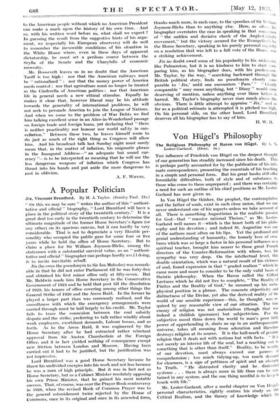A Popular Politician
Jix, Viscount Brentford. By H. A. Taylor. (Stanley Paul. 21s.)
OF this we may be sure" writes the author of this" authori- tative and official" biography, "Lord Brentford will have a place in the political story of the twentieth century." It is a great deal too early in the tirentieth century to determine the ultimate magnitude of the former Home Secretary's figure (or any other) on its spacious canvas, but it can hardly be very considerable. That is not to depreciate a very likeable per- sonality who occupied the public gaze for some four or five years while he held the office of Home Secretary. But to claim a place for Sir William .Thynson-Hicks, among the statesmen with a substantial survival value, as an authori- tative and official " biographer ca. n perhaps hardly avc i I doing, is to invite inevitable rebuff.
Jix (he owes the pseudonyin to Sir Ian Malcolm) was remark- able in that he did not enter Parliament till he was forty-five and obtained his first minor office only at fifty-seven. But Mr. Baldwin made him Home Secretary in the Conservative Government of 1924 and he held that post till the dissolution of 1929, his tenure of office covering among other things the General Strike of 1926 and the Arcos Raid. In the former he played a larger part than was commonly realized, and the smoothness with which the emergency arrangements were carried through must be laid-largely to his credit. Mr. Taylor fails to trace the connexion between the coal subsidy dispute and the strike, preferring to talk rather windily about weak employers, exorbitant demands, Labour bosses, and so forth. As to the Arcos Raid, it was engineered by the Home Secretary after he had extracted rather reluctant approval from Sir Austen Chamberlain at the Foreign Office, and it in fact yielded nothing of consequence except new friction between London and Moscow. Having been carried out it had to be justified, but the justification was not impressive.
Lord Brentford was a good Home Secretary because he threw his undivided energies into his work and not less because he was a man of high principle. But it was in fact not as Home Secretary, but as a Cabinet Minister resolutely opposing his own Prime Minister, that he gained his most notable success. That, of course, was over the Prayer Book controversy in 1928, when the revised Book of Common Prayer was to the general astonishment twice rejected by the House of Commons, once in its original and once in its amended form, thanks much more, in each case, to the speeches of Sir
Joynson-Hicks than to anything else. Here, as oftei., his biographer overstates the case in speaking in that connexion of 'the sudden and decisive check of the Anglo-Catholie movement," but the victory secured for the Evangelica Is bv the Home Secretary, speaking in his purely personal capaeity on a resolution that was left to a full vote of the House. was a striking achievement.
Jix no doubt owed some of his popularity to his nickname, like Palmerston, but it is no kindness to him to start .u. paring him, as his biographer does, with his predecessor. Mr. Taylor, by the way, "searching backward through the British political story, finds no pseudonym closely com- parable to Jix,' until one encounters ' Pam.' " " Closely comparable" may mean anything, but " Dizzy " would seem deserving of mention, unless anything over three letters is barred. Mr. Taylor's biography never rises much above the obvious. There is little attempt to appraise "Jix," and so far as a political estimate is attempted it is pitched too high. On his personal side, on the other hand, Lord Brentford deserves all his biographer has to say of him.
II. W. IL
































 Previous page
Previous page